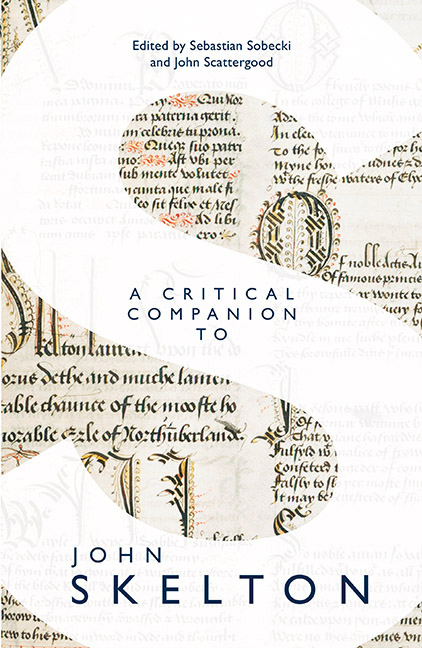Book contents
- Frontmatter
- Dedication
- Contents
- Acknowledgements
- Contributors
- Abbreviations
- Conventions
- Introduction
- 1 John Skelton (?1460–1529): A Life in Writing
- 2 Religion
- 3 Law and Politics
- 4 Classical Literature
- 5 Humanism
- 6 Satires and Invectives
- 7 Lyrics and Short Poems
- 8 Skelton's Voice and Performance
- 9 Literary Tradition
- 10 Skelton and the English Language
- 11 Skelton's English Works in Manuscripts and Print
- 12 Skelton's English Canon
- 13 Reception and Afterlife
- A Skelton Bibliography
- Index of Manuscripts
- Index of Printers and Stationers
- General Index
11 - Skelton's English Works in Manuscripts and Print
Published online by Cambridge University Press: 24 July 2019
- Frontmatter
- Dedication
- Contents
- Acknowledgements
- Contributors
- Abbreviations
- Conventions
- Introduction
- 1 John Skelton (?1460–1529): A Life in Writing
- 2 Religion
- 3 Law and Politics
- 4 Classical Literature
- 5 Humanism
- 6 Satires and Invectives
- 7 Lyrics and Short Poems
- 8 Skelton's Voice and Performance
- 9 Literary Tradition
- 10 Skelton and the English Language
- 11 Skelton's English Works in Manuscripts and Print
- 12 Skelton's English Canon
- 13 Reception and Afterlife
- A Skelton Bibliography
- Index of Manuscripts
- Index of Printers and Stationers
- General Index
Summary
& soe hyt semys they … play
whyche hate to be corektyd
when they be ynfectyd
nor wyll not Suffyr thys boke
by hoke nor yet by croke
pryntyd for to be …
(Collyn Clout, 1234–9, British Library, MS Harley 2252, fol. 153r)So spoke ‘Sceltonyus Lawreatus’ (the attribution occurring solely in British Library, MS Harley 2252) through the satirical mouthpiece of the Everyman persona of Collyn Clout. In this second of what are usually taken to be attacks on Cardinal Wolsey, Skelton makes quite clear the threat of imprisonment under which he writes. His comments about printed publication may explain why the earliest extant edition, by Thomas Godfray in ?1531 (STC 22600.5), did not appear until after the deaths of both Wolsey (29 November 1530) and Skelton himself (21 June 1529), especially since the two men had achieved a reconciliation by late in 1523, when Skelton publicly praises the cardinal, along with the king, in the final (Latin) envoy of the Garlande of Laurell, printed by Richard Faques on 3 October (STC 22610; Scattergood 2014: 351). While the supposed imprisonment of William Cornysh Junior, Gentleman of the Chapel Royal, in the Fleet prison in 1504 for writing a seditious poem remains a matter for debate (his imprisonment is stated in the prologue to the ‘treatise bitwene Trouth, and Informacion’ published in John Stow's Pithy pleasaunt and profitable workes of maister Skelton, Poete Laureate, printed for him by Thomas Marshe in 1568 [STC 22608]), it is known that in 1515 Polydore Vergil was sent to the Tower for writing a letter criticising both Wolsey and the king (Scattergood 2014: 354). In the early 1520s John Colyns, the owner/compiler of British Library, MS Harley 2252, knew of the imprisonment of Edward North for composing poetry against Wolsey, although later in his career he distinguished himself in royal service. (In all probability Skelton also knew of North's fate.) ‘The Ruyn of a Ream’ and later a ‘complaynte’ to Wolsey were written by North while he was still in prison; the latter poem ends ‘Surely all ynglond for hym ys bownde to pray’, and these compositions seem to have served their purpose, for he was released in January 1525 (Meale 2013: 83–4, cat. nos 46, 49).
- Type
- Chapter
- Information
- A Critical Companion to John Skelton , pp. 163 - 179Publisher: Boydell & BrewerPrint publication year: 2018



